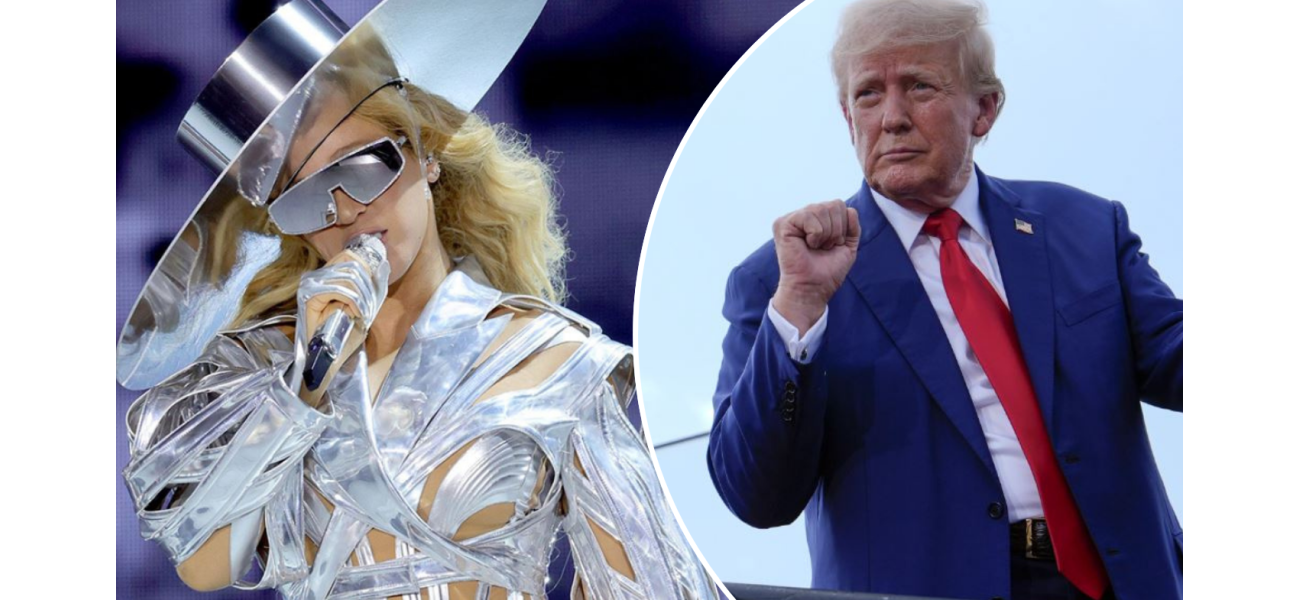Celebrities like Beyoncé, Celine Dion, and Foo Fighters are trying to prevent Trump from using their music, but the situation is complex.
Legal experts say musicians can take legal action beyond just speaking out if their music is used in certain ways.
August 29th 2024.

After US President Joe Biden dropped out of the presidential race and endorsed Kamala Harris for the Democratic presidential nominee, reports surfaced that Beyoncé had given her approval for the Vice President to use "Freedom" as her official campaign song. However, it seemed like an odd choice when the Republican nominee's campaign used the same Beyoncé song in a recent social media video featuring former President Donald Trump.
This isn't the first time that artists have objected to their music being used by the Trump campaign. From Celine Dion and Foo Fighters to Bruce Springsteen and Prince's estate, numerous musicians have spoken out against their music being played at Trump's events. But according to legal experts, the actions artists can take depend on how and where their music is used.
In the case of Beyoncé, it wasn't just a social media post. The Trump campaign also played her music at a rally in Pennsylvania, despite Beyoncé endorsing the Biden-Harris ticket and being a long-time supporter of the Democratic party. When contacted for comment, Beyoncé's representatives did not respond, but it was reported that her label threatened to send a cease-and-desist letter to the Trump campaign after the social media video was posted by campaign spokesperson Steven Cheung. Shortly after the threat, the video was taken down.
In a statement to CNN, Cheung stated that he intentionally used "Freedom" to provoke the opposing party and prove a point about Democrats. However, the use of music in political campaigns is a complex and expensive process. According to attorney Heidy Vaquerano, a licence is required for any use of music, whether it's at a venue, convention, or online on platforms like YouTube or social media. And even if a licence is obtained, artists may still have grounds to object.
Recently, the Foo Fighters spoke out against the Trump campaign for using their song "My Hero" at a rally in Arizona. A representative for the band stated that they were not asked for permission, and any royalties received as a result of the use would be donated to the Harris/Walz campaign. However, Trump's spokesperson Cheung maintains that they have a licence to use the song, despite the band's statement.
There are legal protections for artists when it comes to the use of their name, image, or likeness. Even with a public performance licence, the Trump campaign could be in violation of an artist's publicity rights or could be falsely implying that the artist supports the candidate. According to Vaquerano, in order for a political campaign to use an artist's song on social media, they would need to obtain approval from the songwriters, publisher, and label.
This is not the first time that artists have spoken out against the Trump campaign's use of their music. In the past, artists like Rihanna, Phil Collins, Neil Young, and Adele have all objected to their music being played at Trump's events. And this pattern has continued in the current election cycle. Celine Dion's "My Heart Will Go On" was played at a recent Trump rally in Montana, and her team quickly spoke out, stating that the use was not authorized. And the estate of Isaac Hayes has even filed a copyright infringement suit against Trump for using the soul artist's music at rallies.
According to court documents, the Hayes estate claims that the Trump campaign has not obtained a valid public performance licence and is seeking damages for the unauthorised use of Hayes' music. Trump has not publicly commented on the matter, but sources close to him have stated that he personally selects some of the songs played at his rallies.
In the end, it may be wise for Trump to stick with music from artists who have endorsed him, like Kid Rock. But as the election heats up, we can expect to see more artists speaking out against the use of their music in political campaigns. And for those who do not approve, they may have legal grounds to take action.
This isn't the first time that artists have objected to their music being used by the Trump campaign. From Celine Dion and Foo Fighters to Bruce Springsteen and Prince's estate, numerous musicians have spoken out against their music being played at Trump's events. But according to legal experts, the actions artists can take depend on how and where their music is used.
In the case of Beyoncé, it wasn't just a social media post. The Trump campaign also played her music at a rally in Pennsylvania, despite Beyoncé endorsing the Biden-Harris ticket and being a long-time supporter of the Democratic party. When contacted for comment, Beyoncé's representatives did not respond, but it was reported that her label threatened to send a cease-and-desist letter to the Trump campaign after the social media video was posted by campaign spokesperson Steven Cheung. Shortly after the threat, the video was taken down.
In a statement to CNN, Cheung stated that he intentionally used "Freedom" to provoke the opposing party and prove a point about Democrats. However, the use of music in political campaigns is a complex and expensive process. According to attorney Heidy Vaquerano, a licence is required for any use of music, whether it's at a venue, convention, or online on platforms like YouTube or social media. And even if a licence is obtained, artists may still have grounds to object.
Recently, the Foo Fighters spoke out against the Trump campaign for using their song "My Hero" at a rally in Arizona. A representative for the band stated that they were not asked for permission, and any royalties received as a result of the use would be donated to the Harris/Walz campaign. However, Trump's spokesperson Cheung maintains that they have a licence to use the song, despite the band's statement.
There are legal protections for artists when it comes to the use of their name, image, or likeness. Even with a public performance licence, the Trump campaign could be in violation of an artist's publicity rights or could be falsely implying that the artist supports the candidate. According to Vaquerano, in order for a political campaign to use an artist's song on social media, they would need to obtain approval from the songwriters, publisher, and label.
This is not the first time that artists have spoken out against the Trump campaign's use of their music. In the past, artists like Rihanna, Phil Collins, Neil Young, and Adele have all objected to their music being played at Trump's events. And this pattern has continued in the current election cycle. Celine Dion's "My Heart Will Go On" was played at a recent Trump rally in Montana, and her team quickly spoke out, stating that the use was not authorized. And the estate of Isaac Hayes has even filed a copyright infringement suit against Trump for using the soul artist's music at rallies.
According to court documents, the Hayes estate claims that the Trump campaign has not obtained a valid public performance licence and is seeking damages for the unauthorised use of Hayes' music. Trump has not publicly commented on the matter, but sources close to him have stated that he personally selects some of the songs played at his rallies.
In the end, it may be wise for Trump to stick with music from artists who have endorsed him, like Kid Rock. But as the election heats up, we can expect to see more artists speaking out against the use of their music in political campaigns. And for those who do not approve, they may have legal grounds to take action.
[This article has been trending online recently and has been generated with AI. Your feed is customized.]
[Generative AI is experimental.]
0
0
Submit Comment





